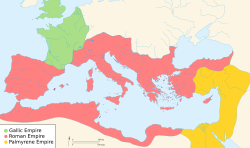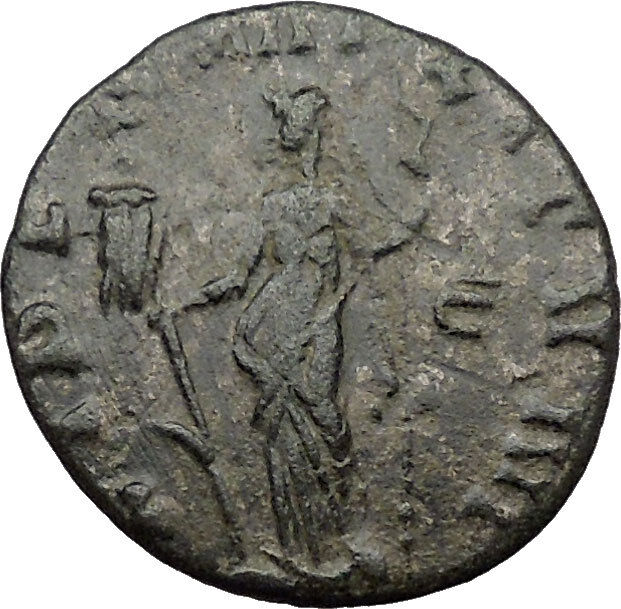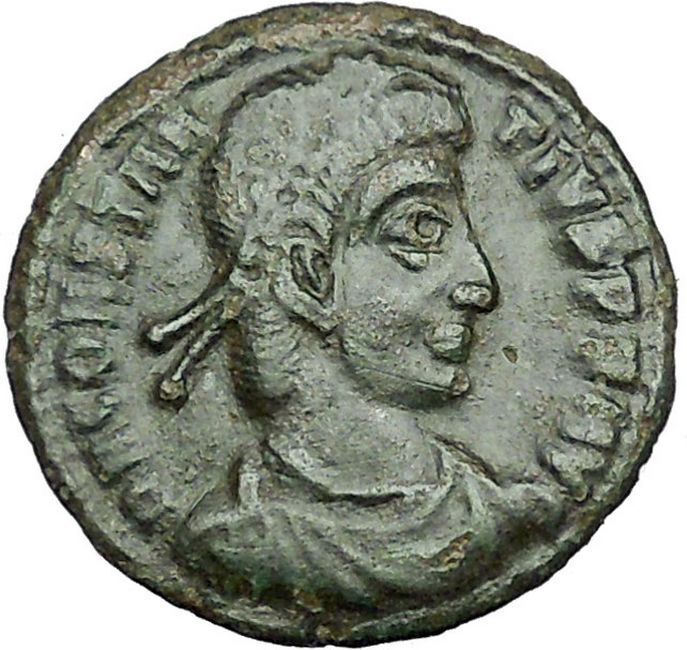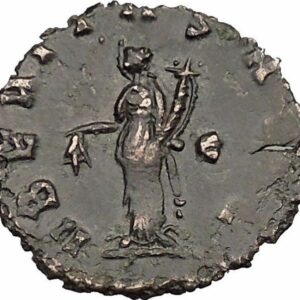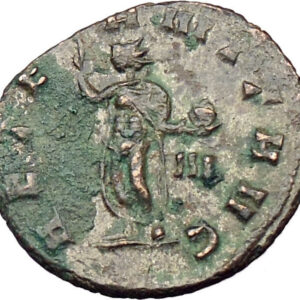|
Tetricus I – Gallic Roman Emperor: 271-274 A.D. –
Bronze Antoninianus 17mm (2.27 grams) Treveri mint 272-273 A.D.
Reference: RIC 57
IMPTETRICVSPFAVG – Radiate, draped and cuirassed bust right.
COMESAVG – Victory advancing left, holding wreath and palm.
You are bidding on the exact
item pictured, provided with a Certificate of Authenticity and Lifetime
Guarantee of Authenticity.
In
Greek mythology,
Nike
was a
goddess who personified
victory, also known as the Winged Goddess of
Victory. The Roman equivalent was
Victoria. Depending upon the time of various
myths, she was described as the daughter of
Pallas (Titan) and
Styx (Water) and the sister of
Kratos (Strength),
Bia (Force), and
Zelus (Zeal). Nike and her siblings were close
companions of
Zeus, the dominant deity of the
Greek pantheon. According to classical (later)
myth, Styx brought them to Zeus when
 the the
god was assembling allies for the
Titan War against the older deities. Nike
assumed the role of the divine
charioteer, a role in which she often is
portrayed in Classical Greek art. Nike flew around battlefields rewarding the
victors with glory and fame.
Nike is seen with wings in most statues and paintings. Most other winged
deities in the Greek pantheon had shed their wings by Classical times. Nike is
the goddess of strength, speed, and victory. Nike was a very close acquaintance
of
Athena, and is thought to have stood in
Athena’s outstretched hand in the statue of Athena located in the Parthenon.
Nike is one of the most commonly portrayed figures on Greek coins.
Names stemming from Nike include amongst others:
Nicholas, Nicola, Nick, Nikolai, Nils, Klaas,
Nicole, Ike, Niki, Nikita, Nika, Niketas, and Nico.
Caius Pius Esuvius Tetricus was Emperor of the
Gallic Empire (Imperium Galliarum) from 270/271 to 273, following the
murder of
Victorinus. Tetricus, who ruled with his son, Tetricus II, was the last of
the Gallic emperors.
Tetricus was born to a noble family and held the administrative rank of
praeses provinciae (provincial governor) of
Aquitania at
the time of
Victorinus’ death. Victorinus’ mother,
Victoria, paid the army heavily to declare Tetricus emperor near Burdigalia
(Bordeaux,
France), which
was approved in
Gaul
and
Britain. Following his appointment, Tetricus repelled Germanic tribes that
took advantage of the confusion following the death of Victorinus to invade.
Tetricus installed his capital at Augusta Treverorum (present
Trier,
Germany, near
the vital Rhine border, hence later seat of a
Tetrarch)
and appointed his son,
Tetricus
II,
Caesar (273). Tetricus made no attempts to expand the Gallic Empire,
other than southward, regaining
Aquitania (which had rejoined the Roman empire during the reign of
Claudius
Gothicus). In late 273 or early 274,
Faustinus,
provincial governor of
Gallia Belgica,
rebelled against him in
Augusta Treverorum.
In 273, Emperor
Aurelian
set out to reconquer the western Roman empire, following his victories in the
east. Tetricus took his army southward from Trier to meet Aurelian, who was
advancing into northern Gaul. The
decisive battle took place near
Châlons-sur-Marne, where Tetricus and his son surrendered to Aurelian.
According to literary sources, after being displayed as trophies at
Aurelian’s
triumph in Rome, the lives of Tetricus and his son were spared by Aurelian,
and Tetricus was even given the title of
corrector
Lucaniae et Bruttiorum, that is governor of a southern region of
Italia. Tetricus died at an unknown date in Italy; he is listed as one of
Rome’s
Thirty Tyrants in the
Historia Augusta.
The Gallic Empire (Latin:
Imperium Galliarum) is the modern
name for a breakaway part of the
Roman Empire that functioned de facto as
a separate state from 260 to 274.It originated during the
Crisis of the Third Century.
The Gallic Empire under
Tetricus I by 271 A.D. (in green)
It was established by
Postumus in 260 in the wake of
barbarian invasions and instability in
Rome, and at its height included the territories of
Germania,
Gaul,
Britannia, and (for a time)
Hispania. After Postumus’ assassination in 268
it lost much of its territory, but continued under a number of emperors and
usurpers. It was retaken by
Roman emperor
Aurelian after the
Battle of Châlons in 274.
History
Origins
The Roman
Crisis of the Third Century continued as
Emperor
Valerian was defeated and captured by the
Sassanid Empire of
Persia, leaving his son
Gallienus in very shaky control. Shortly
thereafter, the
Palmyrene Empire, which came to encompass
Egypt,
Syria,
Judea, and
Arabia Petraea also broke away.
The governors in
Pannonia staged unsuccessful local revolts. The
Emperor left for the Danube to attend to their disruption. This left
Postumus, who was governor of
Germania Superior and
Inferior, in charge at the Rhine border. An
exeptional administrator, Postumus had also protected the Germania Inferior
against an invasion led by the Franks in the summer of 260 very well. In fact,
Postumus defeated the Frankish forces at Empel so decisively, that there would
be no further Germanic raids for 10 years. This all would have combined to make
Postumus one of the most powerful men in the west of the Roman empire.
The imperial heir
Saloninus and the praetorian prefect Silvanus
remained at Colonia Agrippina (Cologne),
to keep the young heir out of danger and perhaps also as a check on Postumus’
ambitions. Before long, however, Postumus besieged Colonia Agrippina and put the
young heir and his guardian to death, making his revolt official. Postumus is
thought to have established his capital at Cologne or Trier,[2]
with Lugdunum also becoming an important city in the empire.
The Gallic Empire had its own praetorian guard, two annually elected consuls
(not all of whose names have survived) and probably its own senate. According to
the numismatic evidence, Postumus himself held the office of consul five times.
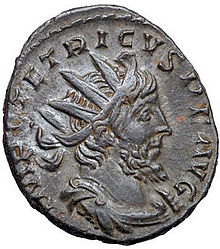
Coin of
Tetricus, last emperor (271-274) of
the Gallic Empire
Postumus successfully fended off a military incursion by Gallienus in 263,
and was never challenged by him again. However, in early 268 he was challenged
by
Laelianus, probably one of his commanders, who
was declared emperor at Mogontiacum (Mainz)
by his
Legio XXII Primigenia. Postumus quickly retook
Mogontiacum and Laelianus was killed. Postumus himself, however, was overthrown
and killed by his own troops, reportedly because he did not allow them to sack
the city.[3][4]
After Postumus
After the death of Postumus, the Gallic Empire began to decline. Roman
Emperor
Claudius Gothicus re-established Roman
authority in
Gallia Narbonensis and parts of
Gallia Aquitania, and there is some evidence
that the provinces of Hispania, which did not recognize the subsequent Gallic
Emperors, may have re-aligned with Rome then.[5][6]
Marius was instated as Emperor upon Postumus’
death, but died very shortly after; ancient sources writing much later state
that he reigned only two days, though it is more likely, as displayed through
the numismatic record, that he reigned for a few months.[7]
Subsequently
Victorinus came to power, being recognized as
Emperor in northern Gaul and Britannia, but not in Hispania.[5]
Victorinus spent most of his reign dealing with insurgencies and attempting to
recover the Gaulish territories taken by Claudius Gothicus. He was assassinated
in 271, but his mother
Victoria took control of his troops and used
her power to influence the selection of his successor.[5]
With Victoria’s support,
Tetricus was made Emperor, and was recognized
in Britannia and the parts of Gaul still controlled by the Empire.[8]
Tetricus fought off Germanic barbarians who had begun ravaging Gaul after the
death of Victorinus, and was able to re-take Gallia Aquitania and western Gallia
Narbonensis while Roman Emperor
Aurelian was engaging Queen
Zenobia’s
Palmyrene Empire in the east. He established
the imperial court at
Trier, and in 273 he elevated his son,
also named Tetricus, to the rank of
Caesar. The following year the younger Tetricus
was made co-consul, but the Empire grew weak from internal strife, including a
mutiny led by the usurper
Faustinus.[8]
By that time Aurelian had defeated the Palmyrene Empire and had made plans to
re-conquer the west. He moved into Gaul and defeated Tetricus at the
Battle of Châlons in 274; according to some
sources, Tetricus offered to surrender in exchange for clemency for him and his
son before the battle.[8]
This detail may be later propaganda, but either way, Aurelian was victorious,
and the Gallic Empire was effectively dismantled.[8]
Causes
The Gallic Empire was symptomatic of the fragmentation of power during the
third-century crisis. It has also been taken to represent autonomous trends in
the western provinces, including proto-feudalistic tendencies among the Gaulish
land-owning class whose support has sometimes been thought to have underpinned
the strength of the Gallic Empire, and an interplay between the strength of
Roman institutions and the growing salience of provincial concerns.[10]
One of Postumus’ primary objectives as emperor was evidently the defence of the
Germanic frontier; in 261 he repelled mixed groups of
Franks and
Alamanni to hold the Rhine
limes secure (though lands beyond the upper
Rhine and Danube had to be abandoned to the barbarians within a couple of
years). In so doing, Postumus positioned himself avowedly as not only the
defender and restorer of Gaul, but also as the upholder of the Roman name.
The usurpation of power over Britain and northern Gaul by
Carausius just twenty years later reflects a
continuing trend by which local loyalties from the landed aristocracy and
deteriorating morale in the legions enabled Carausius to seize power in Britain.[citation
needed] Similarly with the withdrawal of legions
after 408, many Britons desired a localized Roman authority rather than
nationalist revolt. The desire for Roman order and institutions was entirely
compatible with a degree of national or regional separatism.
Gallic Emperors
The Gallic Emperors are known primarily from the
coins they minted. The political and military history of the Gallic
Empire can be sketched through the careers of these emperors. Their names are as
follows:
-
Postumus 260-268
-
Marius 268
-
Victorinus 268-270
- (Domitianus
271? usurper)
-
Tetricus the elder[14]
270-274
-
Tetricus the younger 270-274 (son of
Tetricus;
caesar)
Consuls of the
Gallic Empire
| Year |
Consul |
Consul |
| 260 |
Postumus (second time) |
unknown |
| 261 |
Postumus (third time) |
| 262 |
unknown |
| 263 |
| 264 |
| 265 |
Postumus (fourth time) |
| 266 |
| 267 |
unknown |
| 268 |
Postumus (fifth time) |
Victorinus (first time) |
| 269 |
unknown |
unknown |
| 270 |
Victorinus (second time) |
Sanctus |
| 271 |
Tetricus (first time) |
unknown |
| 272 |
Tetricus (second time) |
| 273 |
Tetricus (third time) |
| Year and sequence unknown: |
| ? |
Censor (twice) |
Lepidus (twice) |
| ? |
Dialis |
Bassus |
| ? |
“Apr.” |
“Ruf.” |
|




 the
the 